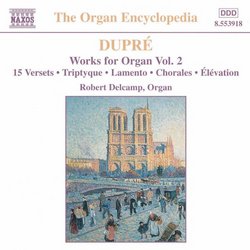| All Artists: Marcel Dupre, Robert Delcamp Title: Dupr�: Works for Organ, Vol. 2 Members Wishing: 0 Total Copies: 0 Label: Naxos Release Date: 6/2/1998 Genre: Classical Style: Symphonies Number of Discs: 1 SwapaCD Credits: 1 UPC: 730099491822 |
Search - Marcel Dupre, Robert Delcamp :: Dupr�: Works for Organ, Vol. 2
 | Marcel Dupre, Robert Delcamp Dupr�: Works for Organ, Vol. 2 Genre: Classical
|
Larger Image |
CD DetailsSimilar CDs |
CD ReviewsGreat pieces, great performance Daniel Mitterdorfer | Sydney, Australia | 09/07/2000 (5 out of 5 stars) "The Möller organ (5 manuals and pedal) of the West End United Methodist Church, Nashville, Tennessee makes a wonderful sound on this disc! The opening Antiphon I allows use of Full Organ and a full organ it is - the reeds aren't too penetrating and at the same time it could almost be mistaken for a Cavaille-Coll. Delcamp's playing is very precise and his choice of registration would probably be close to that of Dupré. The Vêspres is a challenging work, and one of my favourite group of pieces by Dupré. Each one is largely different in tone colour, usually attributable to registration, meter and the position on the scale where the melody line of each piece is pitched. This variety is what makes them an interesting work.Lamento was written for friends of Dupré's who's child suddenly died. The piece has a very intimate feel to it and very deliberately, in its chromatically ascending chords, an overt outpouring of grief and rage can be felt.The 6 Chorales provide some variation to the programme, building on those recorded on Volume 1. Also, hearing only a few at a time allows the listener more room for contemplation of the music. Dupré wrote his 79 Chorales as preparatory pieces for learning J.S. Bach's Chorale Preludes, and there's no doubt, through listening to these, that Dupré himself was a great fan of Bach.Élévation was published when Dupré was 26, and is his earliest published work. It is a gorgeous little piece that is very melodic and soothing to listen to. Triptyque, paying homage to older forms, consists of three movements: I. Chaconne, II. Musette and III. Dithyrambe."
|

 Track Listings (26) - Disc #1
Track Listings (26) - Disc #1


